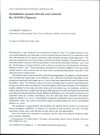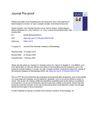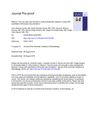 179 citations,
October 2018 in “American Journal of Clinical Dermatology”
179 citations,
October 2018 in “American Journal of Clinical Dermatology” Cancer treatments targeting specific cells and the immune system can cause skin, mouth, hair, and nail problems, affecting patients' quality of life and treatment adherence.
 59 citations,
July 2020 in “Journal of The American Academy of Dermatology”
59 citations,
July 2020 in “Journal of The American Academy of Dermatology” Oral minoxidil promotes hair growth but may cause side effects; needs monitoring.
 53 citations,
October 1993 in “Drug Safety”
53 citations,
October 1993 in “Drug Safety” Oral retinoids can cause side effects ranging from mild to severe, including birth defects, and require careful monitoring and contraception.
 44 citations,
October 2017 in “Journal of the American Academy of Dermatology”
44 citations,
October 2017 in “Journal of the American Academy of Dermatology” Tofacitinib is effective and safe for treating severe hair loss in Korean patients.
 37 citations,
October 2017 in “Clinical and Experimental Dermatology”
37 citations,
October 2017 in “Clinical and Experimental Dermatology” Oral tofacitinib shows promise in treating atopic dermatitis and alopecia areata, but only slight improvement in vitiligo.
 36 citations,
November 1995 in “Clinical endocrinology”
36 citations,
November 1995 in “Clinical endocrinology” Low-dose flutamide helps reduce excessive hair growth and is even more effective with birth control, without bad effects on blood fats.
 36 citations,
September 2018 in “Dermatologic Therapy”
36 citations,
September 2018 in “Dermatologic Therapy” Oral minoxidil helps hair growth, is cost-effective, and mostly well-tolerated.
36 citations,
June 2016 in “Journal of dermatological treatment” The combination therapy significantly improved Riehl’s melanosis in patients without serious side effects.
31 citations,
February 1982 in “Archives of dermatology” Etretinate was effective for certain skin conditions, but caused side effects like chapped lips, dry mucous membranes, and hair loss.
 26 citations,
October 2020 in “Pediatric Dermatology”
26 citations,
October 2020 in “Pediatric Dermatology” Oral tofacitinib may effectively treat hair loss in children with alopecia areata.
 24 citations,
July 1983 in “Clinical and Experimental Dermatology”
24 citations,
July 1983 in “Clinical and Experimental Dermatology” Tigason improved hair growth in a boy with monilethrix without side effects.
 23 citations,
September 2019 in “Journal of The American Academy of Dermatology”
23 citations,
September 2019 in “Journal of The American Academy of Dermatology” Tofacitinib and oral minoxidil together effectively regrow hair in severe alopecia areata patients.
 22 citations,
January 2006 in “International Journal of Andrology”
22 citations,
January 2006 in “International Journal of Andrology” Taking oral testosterone with finasteride or dutasteride doubles testosterone levels, and food slightly affects it.
 19 citations,
June 2020 in “International Journal of Dermatology”
19 citations,
June 2020 in “International Journal of Dermatology” Low-dose oral minoxidil effectively treats non-scarring hair loss with some side effects like hypertrichosis and postural hypotension.
 13 citations,
February 2020 in “Journal of the American Academy of Dermatology”
13 citations,
February 2020 in “Journal of the American Academy of Dermatology” Microneedling and oral tranexamic acid both improve facial melasma, but microneedling shows more sustained benefits.
 13 citations,
May 2015 in “Journal of The American Academy of Dermatology”
13 citations,
May 2015 in “Journal of The American Academy of Dermatology” Oral minoxidil improves hair growth in men with hair loss, but caution needed for those with heart issues.
 13 citations,
November 2021 in “Pediatric Dermatology”
13 citations,
November 2021 in “Pediatric Dermatology” Tofacitinib taken by mouth helps treat hair loss in children.
 11 citations,
February 2021 in “Journal of Cosmetic Dermatology”
11 citations,
February 2021 in “Journal of Cosmetic Dermatology” Oral tofacitinib helped regrow hair in over half of the patients with severe alopecia, but relapses and side effects were common.
 11 citations,
December 2010 in “The Journal of Urology”
11 citations,
December 2010 in “The Journal of Urology” Taking oral testosterone with or without dutasteride increases testosterone levels and could be an effective treatment for low testosterone.
 11 citations,
November 2019 in “Journal of the American Academy of Dermatology”
11 citations,
November 2019 in “Journal of the American Academy of Dermatology” Oral tofacitinib is a promising treatment for beard hair loss in alopecia areata.
 10 citations,
October 2010 in “International Journal of Andrology”
10 citations,
October 2010 in “International Journal of Andrology” Finasteride doesn't affect oral testosterone undecanoate, and high DHT levels may cause acne, prostate issues, and hair loss.
 9 citations,
October 2019 in “Dermatologic Therapy”
9 citations,
October 2019 in “Dermatologic Therapy” Oral tofacitinib has a moderate success rate and is generally safe for treating hair loss in some patients.
 8 citations,
June 2022 in “Frontiers in Medicine”
8 citations,
June 2022 in “Frontiers in Medicine” Both individual and combined treatments of tofacitinib and corticosteroids can help regrow hair in moderate-to-severe alopecia areata, but ongoing treatment may be necessary.
8 citations,
August 2016 in “Journal of the European Academy of Dermatology and Venereology” Oral tacrolimus helped a rheumatoid arthritis patient regrow hair lost due to alopecia areata.
 7 citations,
May 2012 in “International Journal of Andrology”
7 citations,
May 2012 in “International Journal of Andrology” The new oral testosterone pill normalized testosterone levels and lowered SHBG in men with low testosterone.
 5 citations,
January 1987 in “Gynecologic and obstetric investigation”
5 citations,
January 1987 in “Gynecologic and obstetric investigation” Cyproterone acetate implants were more effective at reducing facial hair and improving skin in severe hirsutism than oral treatment.
 4 citations,
July 2018 in “PubMed”
4 citations,
July 2018 in “PubMed” Oral and topical tofacitinib can help regrow hair in people with severe alopecia areata.
 3 citations,
June 2023 in “Journal of cosmetic dermatology”
3 citations,
June 2023 in “Journal of cosmetic dermatology” A new drug, abrocitinib, helped a child with severe hair loss regrow hair.
 3 citations,
September 2019 in “Journal of The American Academy of Dermatology”
3 citations,
September 2019 in “Journal of The American Academy of Dermatology” Low-dose oral minoxidil effectively treats mild-moderate male hair loss, alone or combined with other therapies.
 2 citations,
January 2014 in “Advanced Biomedical Research”
2 citations,
January 2014 in “Advanced Biomedical Research” Oral isotretinoin and cyproterone compound are equally effective for treating acne in women with cutaneous hyperandrogenism.


























